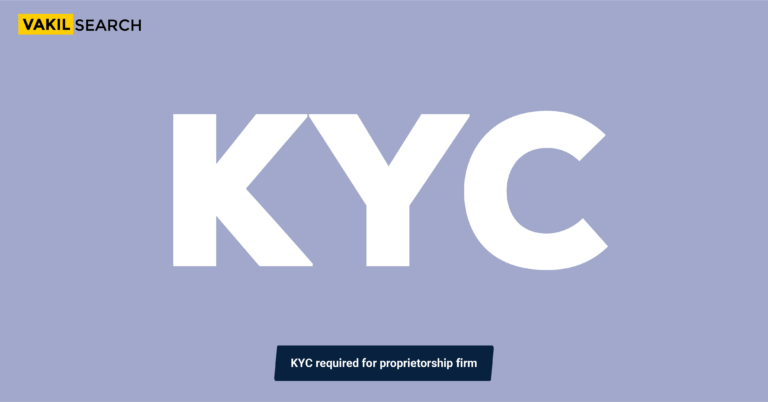Did you start a business as a sole proprietor? Congratulations! Now make sure you understand the taxation for sole proprietorship Firm in India. Read on to know more!
Sole Proprietorship Firm or independent contractor can help you manage your finances more efficiently. However, it’s important to understand how your business structure affects your tax deductions for sole proprietorship in India. There are many tax laws that sole proprietors need to know. This guide will help you understand about the taxation for sole proprietorship in India & optimize a tax strategy for your business needs and goals.
What Is A Sole Proprietorship?
As the name suggests, a sole proprietorship Firm is an autonomous business run by one person. This business model also requires no government registration and can be operated with the least amount of difficulty. Infact, it is very well-liked in the unorganised business sector because it is simple to start and requires less compliance.
Sole Proprietorship Taxation
Unlike other types of businesses, a sole proprietorship is taxed differently. In India, sole proprietors are exempt from filing a separate tax return for the revenue received from their business. Simply put, the revenue earned by sole proprietors is considered personal income and is taxed appropriately.Based on the slab rates that apply to his/her taxable income, sole proprietors must resolve their tax obligations in accordance with current IT regulations. The taxation for sole proprietorship in india is the same as that of the individual.When the sole proprietor is under 60 years of age, the tax rate for sole proprietorships is as follows:
| Taxable Income | Tax Rate |
| Up to ₹2,50,000 | Nil |
| ₹2,50,000 to ₹5,00,000 | 5% |
| ₹5,00,000 to ₹10,00,000 | 20% |
| Above ₹10,00,000 | 30% |
When the sole proprietor is between the ages of 60 and 80, the tax rate for sole proprietorships is as follows:
| Taxable Income | Tax Rate |
| Up to ₹3,00,000 | Nil |
| ₹3,00,000 to ₹5,00,000 | 5% |
| ₹5,00,000 to ₹10,00,000 | 20% |
| Above ₹10,00,000 | 30% |
When the sole proprietor is above 80 years of age, the tax rate for sole proprietorships is as follows:
| Taxable Income | Tax Rate |
| Up to ₹5,00,000 | Nil |
| ₹5,00,000 to ₹10,00,000 | 20% |
| Above ₹10,00,000 | 30% |
Rate of Surcharge: Surcharges are taxes applied to taxes. It is imposed on tax owed rather than income generated. For instance, if Mr. X receives an income of ₹100 and is subject to a tax of ₹30, an additional 10% surcharge would be levied to the income tax value, bringing the total taxable amount to ₹33. A 10% surcharge is currently imposed on individuals whose income exceeds ₹50 lakhs. Similarly, a 15% surcharge would be levied on the individual’s income if it exceeded the ₹1 crore threshold.
Health and Education Cess: Regardless of income, a 4% health and education cess is charged on “income tax and surcharge.”
Rebate Under Section 87A: A resident person may qualify for the rebate provided his annual income does not exceed ₹5,00,000. The reimbursement will be equal to 100% of income tax or ₹12,500, whichever is less.
How To File Your Sole Proprietorship Tax Returns
Prior to submitting an income tax return, the sole proprietor must secure a Permanent Account Number. However, because a sole proprietorship business lacks a separate identity, the issuance authority will be unable to provide the applicant with an independent PAN. As a result, the PAN card issued to the sole proprietor will be used to comply with income tax-related regulations. Individuals who own a sole proprietorship must file the ITR-3 form. A sole proprietor can accomplish this goal by using a digital signature on an online platform. The deadline for filing an income tax return for sole proprietors is July 31.The deadline for filing is further extended to September 30th if the sole proprietorship’s income tax return requests a statutory audit under the Income Tax Act. Please be aware that in order to keep the procedure legitimate, the registered CA must conduct an audit.
Tax Audit Applicability For Sole Proprietorship Firm
In the context of a sole proprietorship firm, tax audits are applicable in the following situations:
- If the single proprietorship firm’s overall gross receipts, sales, or turnover exceeds ₹1 Crore; or
- If the total gross receipts of the sole proprietorship firm’s active profession exceed ₹50 lakhs.
Conclusion
Addressing your tax liability is relatively easier for a sole proprietor than it is for other business models. The income of sole proprietors is taxed as personal income, which makes keeping track of tax obligations simpler. Due to the fact that sole proprietorships are not considered as separate legal entities, their liabilities and assets are different.You only need to combine the income, profit, and losses of your sole proprietorship on a single ITR form. Vakilsearch can help you figure out the best methods of fulfilling such responsibilities, whether it is a matter of addressing tax liabilities or filling out ITR on short notice.
Read more:










